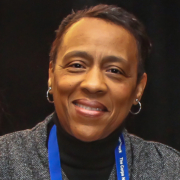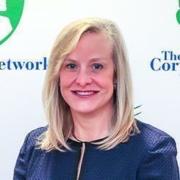
Deborah “Debbie” Dorsett, Executive Director of Greater Miami Service Corps, is a 2023 winner of The Corps Network Legacy Achievement Award. The Legacy Achievement Award is one of the highest honors The Corps Network grants and recognizes exceptional leadership and notable achievements within the national Service and Conservation Corps community. Honorees are those who have worked for at least 15 years in the Corps world, served in a senior leadership position at a Corps, and made significant contributions to the national movement.
Debbie Dorsett has led Greater Miami Service Corps (GMSC) with strength and compassion for nearly 20 years. She has been with the program for over 30 years. Among other responsibilities, her role includes leading the organization’s development efforts, grant implementation, contract management, and delivery of job training and social services. Within the Corps community, Debbie is recognized as a mentor, a champion for today’s young adults, and a powerful advocate for the resources needed to support those who may face barriers on their career and education journey. Debbie has guided GMSC in creating strong career pathways and developing meaningful partnerships with the city, local employers, and other supporters.
Through more than 30 years in public administration, Debbie has served in numerous leadership positions, including as the former Chair of The Corps Network Board Directors. She currently serves as a member of The Corps Network Board of Directors; as Assistant Treasurer of the Women Involved in Service to Humanity (WISH) Foundation; Vice Chairman of NieCat Foundation of Excellence; Vice President of the Florida YouthBuild Coalition; and Chair of the Risk Management Committee of Alpha Kappa Alpha Sorority, Incorporated Gamma Zeta Omega Chapter. In 2019, she was awarded by Legacy Magazine as one of the 50 top influential Black business leaders and public official of the year. Debbie received a Bachelor of Science Degree in Business Management from Florida Memorial University, and she earned a Master of Business Administration from St. Thomas University.
We interviewed Debbie to learn more about her, her experience in the Corps movement, and her current endeavors.
Tell us a bit about your background.
I hail from the beautiful island of St. Thomas in the United States Virgin Islands. I relocated to Miami to attend school, receiving my undergraduate degree in business management from Florida Memorial University, the only Historically Black College and University (HBCU) in South Florida. I later attended St. Thomas University, where I received a Master’s in Business Administration with a concentration in Management and Human Resources. I started my career with the Department of Labor Project Independence and later with Miami-Dade County Transit Department Fair Employment Practices and Labor Relations. I had the opportunity to join the Greater Miami Service Corps family after meeting the former executive director, Hubert James, at a professional networking event.
Who are some of your personal and professional heros?
Some of my professional heroes include Commissioner Barbara J. Jordan, the first executive director of the Greater Miami Service Corps. She is a lifelong public servant who, through her service, created legislation that will permanently impact the lives of residents in Miami-Dade County. One such legislation was workforce housing to address concerns with affordable housing. Another is Jill Beach, a former Greater Miami Service Corps Vice Chair, a great mentor, and friend. Another is our Board Chair, Lonnie Lawrence, a civil rights leader in our community. Within our national youth network, Marilee Eckert, Carolyn Rose, Carolyn Wallace, Marie Walker, Lori Godorov, and Dorothy Stoneman are just a few. Throughout my journey, so many brilliant leaders, board members, and colleagues have inspired me or provided a kind word needed for our work.
How did you become involved with Service and Conservation Corps?
I have proudly been a part of the Corps movement since 1997 when I joined the Greater Miami Service Corps as the Education and Training Coordinator. Since then, I have been blessed to grow tremendously through great mentors. I am motivated by our young people and their resilience. When I worked for the State of Florida, I was over the teen parent program, my participants would always bring letters of support from the Greater Miami Service Corps. Joining the Corps was always part of my destiny.
What is the primary wisdom you would give Corps staff working today?
A piece of wisdom I would share with Corps staff is to find balance. For many years in my journey, I would spend countless hours at the office, participating in events, town halls, or attending special projects. It took a long time for me to realize that to be the best for our young people and staff, I needed to disconnect. Today, we call it self-care, mental health days, or whatever term is used, taking breaks to refresh, renew, and reconnect is vital to be your best.
What is your advice to young people serving in Corps today?
Corps offers many opportunities for young people to connect to careers, gain leadership skills, reach their academic goals, and learn how to become part of a team. Many of our members become family, with relationships that have lasted well beyond their Corps experience. Corps connect members to post-secondary education and employment. Take advantage of every opportunity. You never know where it may lead.
How do you think that the Corps helps empower young people to become the next generation of leaders?
Corps give our young people a voice to share their personal needs and the needs of their communities. Often, our young people are ignored or told to conform or adapt to a particular situation or environment. Through workshops such as Image Is Power, Civic Engagement, and Public Speaking competitions, our young people gain confidence in their voices and the power to convey their concerns. Mentorship is another essential component of breaking down barriers. Whether it is program staff or outside mentors, connecting our young people to people who share similar experiences is critical. We are proud that many members have gone on to leadership roles within their careers, local communities, or county government.
What is your fondest memory or favorite anecdote from working in the Corps world?
My favorite quote came from the former director of American YouthWorks, Richard Halpin. He often used the term “Youth At-Promise.” That phrase always resonated with me. In the past, many names used to describe our young people implied a negative perception, e.g., disadvantaged and at-risk are two that come to mind. “Youth At-Promise” provided a more optimistic view of our young people.
You’ve served in public administration for over 30 years, including serving in leadership positions on The Corps Network’s Corps Council. How have these experiences informed your role as the Executive Director of GMSC?
Whether educating our leaders on legislation about Corps, funding, or connecting resources to benefit our young people, serving with diverse leaders has provided me with a reciprocal benefit of growth and development. Serving on the Corps Council and being part of the “Corps Community” with like-minded colleagues provides a greater perspective of my “why.” These experiences have shaped my goals as executive director. I strive to be innovative with continuous feedback from staff and members to improve service delivery. At the same time, my goal is to nurture the next generation of productive citizens in our community—the how is often achieved through conversations with directors and leaders in the field.
What would you say is one of your proudest achievements during your time at GMSC?
There are so many proud moments in my journey. One of my most memorable achievements is Greater Miami Service Corps receiving certification from the Florida Department of Education as a state certified pre-apprenticeship program in Carpentry and Construction Laborer. These certifications are important in solidifying the training and experience members gain during their term of service. Another memorable moment was opening a charter school on the Greater Miami Service Corps campus. GMSC collaborated with a non-profit charter school that was affiliated with our local job corps centers. Greater Miami Service Corps, at the time, was the organization’s first community-based non-profit partner.
What have you worked to achieve at GMSC that can be translated to other Corps across the country?
Greater Miami Service Corps has substantial projects with our county partners that impact community residents. Two such projects are our housing beautification program, where we target primarily seniors and provide painting and landscape services. The second which is our latest aligns with Climate Corps goals; our Water and Sewer Pre-apprenticeship Program (Septic-to-Sewer) which provides connectivity services for residents impacted by sea level rise. There is no cost to residents. To implement the program, our members received training in plumbing from Florida International University. Our young people and a trained supervisor can now provide this service to residents meeting low-to-moderate income guidelines.
What developments would you like to see in the broader Corps movement?
Today is a pivotal time in our Corps movement with the Infrastructure Investment and Jobs Act. Investments in training based on regional goals are essential to connecting our young people to high-skill/high-wage jobs. Corps are an important part of the national strategy to support infrastructure projects with our federal, state, and local partners. Corps are also the answer to the local approach to address the needs of underserved communities.
Several cities across the country are looking to start Corps programs. Do you have any advice for organizations or cities that want to start a more urban-based program?
Understanding the local needs of young people and the community is essential. Stay driven by something other than funding as the priority for creating the program. Join a consortium or developing collaborative partnerships are crucial to implementing any program, new or old. Identify unrestricted revenue sources. Flexible monetary resources are often necessary to leverage federal or state funding. Finally, identify social entrepreneurship opportunities that address community concerns, provide members with transferable skills, and provide revenue for your organization. Managing a Corps is challenging work. The reward is knowing you are providing services that empower our young people to build a better life.
We will celebrate Debbie’s dedication to supporting the Corps movement at our National Conference. Join us then to recognize Debbie and other TCN 2023 award winners.






























































